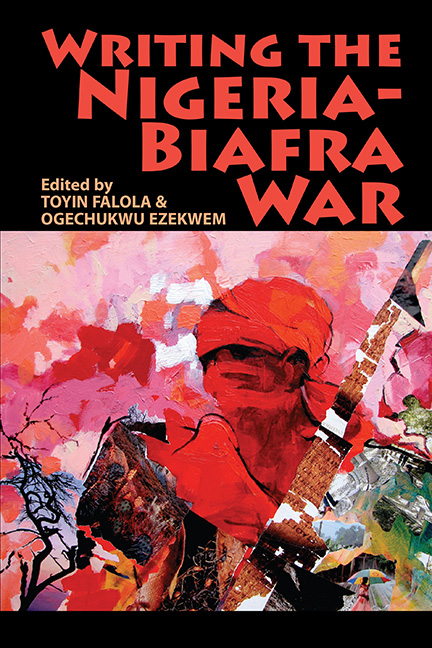Book contents
- Frontmatter
- Contents
- Notes on Contributors
- List of Abbreviations
- Timeline
- Map of Biafra 30 May 1967 – 1 May 1969
- 1 Scholarly Trends, Issues, and Themes: Introduction
- Part I On The History Of The Nigeria-Biafra War
- Part II Critical Debates On The Nigerian Crisis
- Part III The War In Fiction, Memoir, And Imagination
- Part IV Locating Gender In Nigeria-Biafra War Literature
- Select Bibliography
- Index
14 - Biafra in the Irish Imagination: War and Famine in Banville’s An End to Flight and Forristal’s Black Man’s Country
Published online by Cambridge University Press: 17 June 2021
- Frontmatter
- Contents
- Notes on Contributors
- List of Abbreviations
- Timeline
- Map of Biafra 30 May 1967 – 1 May 1969
- 1 Scholarly Trends, Issues, and Themes: Introduction
- Part I On The History Of The Nigeria-Biafra War
- Part II Critical Debates On The Nigerian Crisis
- Part III The War In Fiction, Memoir, And Imagination
- Part IV Locating Gender In Nigeria-Biafra War Literature
- Select Bibliography
- Index
Summary
The idea of Biafra resonated in Ireland for a variety of reasons and, in the late 1960s, Biafra was a constant presence in the Irish media. In this chapter I will consider the representation of the war and famine in Biafra in Irish fiction, with a particular focus on two texts: the novel, An End to Flight (1973) and the play, Black Man's Country (1974). These two substantial texts from Ireland describe how the situation was experienced by the Irish people who stayed in Biafra after secession, and thus provide an alternative perspective on the war. Nigerian authors produced many works of fiction describing the events in Biafra, both during and after the war, but these two fictional works, written primarily for Irish audiences, demonstrate an interest in and familiarity with the events that is perhaps unexpected from a small, geographically distant, European country. The existence of these texts demonstrates awareness of the short-lived Biafran state and the war and famine, but it also raises questions: do these works provide a commentary on Biafra or merely an account of Irish men and women abroad? Do these writings explain or elaborate on the Irish relationship with Biafra?
Ireland's relationship with Biafra was ambiguous – the popular and official responses to the breakaway republic were at variance. The Irish government never formally acknowledged the existence of the Republic of Biafra, but the Irish people spoke about and thought of Biafra as a real nation. In official documents, it was carefully noted as ‘Biafra’ or the Eastern Region of Nigeria, but in the print media quotation marks were never used around the name. In popular discourse the Biafran state was accepted as a legitimate and real entity; there was no uncertainty or ambiguity about its existence. It was accepted that ‘there was a country’.
Ireland's relationship with the African continent had developed during the twentieth century as a result of religious missions to convert Africans to Christianity:
That fire has been kindled in Ireland. If history speaks truly it is the mission of the Irish to fan it to a bright flame on the hearths of the homeland and to carry its embers abroad to light up the darkness of paganism.
- Type
- Chapter
- Information
- Writing the Nigeria-Biafra War , pp. 284 - 313Publisher: Boydell & BrewerPrint publication year: 2016



